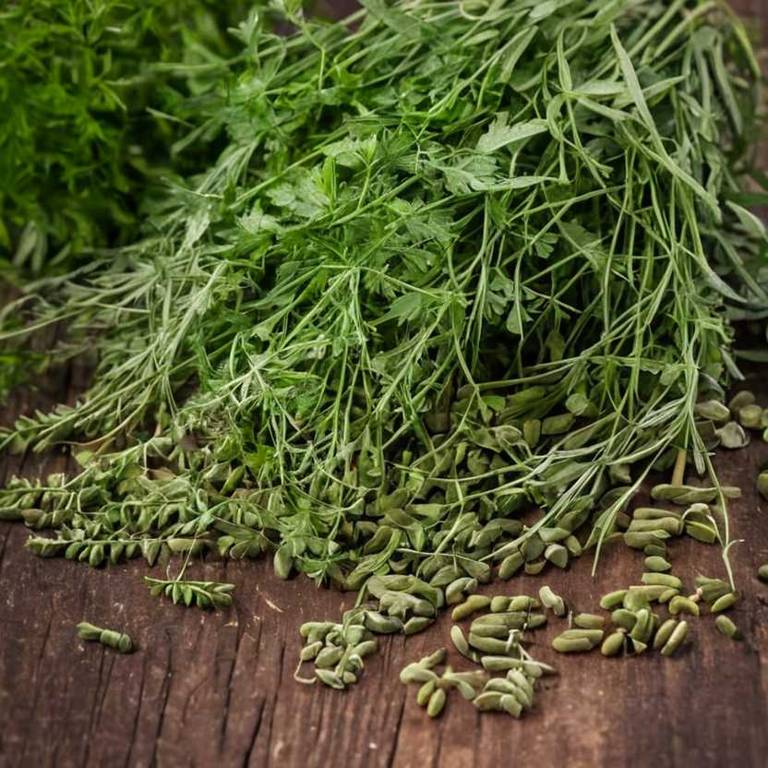By Leen Randell
Updated: Jul 06, 2024
What Are The Medicinal Properties Of Coriandrum Sativum (Coriander)?

Coriandrum sativum, also known as coriander, has health benefits such as reducing inflammation and relieving digestive issues.
The herb is rich in medicinal constituents like limonene, linalool, and borneol, which are responsible for its therapeutic properties. Medicinally, it is prepared in the form of oils, infusions, and tinctures, which are used to treat various ailments. However, excessive consumption may lead to stomach upset and allergic reactions.
Pregnant and breastfeeding women should consult a healthcare professional before using this herb due to its potential effects on fetal and infant health.
This article explains the health benefits, active constituents, medicinal preparations, possible side effects, and precautions related to Coriandrum sativum.
- What are the health benefits of Coriandrum sativum?
- What are the active constituents of Coriandrum sativum?
- What are the medicinal preparations of Coriandrum sativum?
- What are the possible side effect of using Coriandrum sativum improperly?
- What precautions to take when using Coriandrum sativum medicinally?
What are the health benefits of Coriandrum sativum?
Coriandrum sativum, also known as coriander, has health benefits such as reducing inflammation and improving digestion.
Its essential oils have been shown to have antimicrobial properties, while its flavonoids may help to reduce oxidative stress and protect against chronic diseases.
Coriander has also been traditionally used to alleviate symptoms of menopause, including hot flashes and mood swings, and may help to lower blood sugar levels in individuals with diabetes.
Here's a detailed article about the 10 health benefits of Coriandrum sativum.
What are the active constituents of Coriandrum sativum?
Coriandrum sativum, also known as coriander, has active constituents such as limonene, linalool, and borneol, which are known for their antimicrobial, anti-inflammatory, and antioxidant properties.
The herb's essential oil also contains coriandrin, a compound that exhibits analgesic and antispasmodic activities.
Additionally, coriander contains flavonoids, terpenes, and phenolic acids, which contribute to its medicinal efficacy in treating various health conditions, including digestive issues and skin irritations.
Here's a detailed article about the 10 active constituents of Coriandrum sativum.
What are the medicinal preparations of Coriandrum sativum?
Coriandrum sativum, also known as coriander, has medicinal preparations such as essential oil, seeds, and leaves.
The seeds are used to treat digestive issues, nausea, and flatulence. Coriander essential oil is used in aromatherapy for its calming and anti-inflammatory properties.
The leaves are used to treat colds and coughs. The plant's seeds and leaves also possess antioxidant and antimicrobial properties, making it a valuable herbal remedy for various health conditions.
Its extracts are also used to stabilize blood sugar levels and lower cholesterol.
Here's a detailed article about the 10 medicinal preparations of Coriandrum sativum.
What are the possible side effect of using Coriandrum sativum improperly?
Improper use of Coriandrum sativum, also known as coriander, increases the chances of experiencing side effects such as dizziness, nausea, and stomach discomfort.
High doses can also cause skin irritation, allergic reactions, and respiratory problems in some individuals. Furthermore, coriander may interact with certain medications, including blood thinners, and worsen conditions like diabetes, epilepsy, and low blood pressure.
It is essential to consult a healthcare professional before consuming coriander for medicinal purposes.
Here's a detailed article about the 10 most common side effects of Coriandrum sativum.
What precautions to take when using Coriandrum sativum medicinally?
Before using Coriandrum sativum, also known as coriander, for medicinal purposes, you must take precautions such as consulting with a qualified healthcare professional or registered herbalist, as it can interact with certain medications, including blood thinners, diabetes medications, and lithium.
Additionally, individuals with allergies, digestive issues, or pregnancy should exercise caution, as coriander can exacerbate these conditions.
Proper dosing and preparation are also essential to minimize potential side effects.
Here's a detailed article about 10 precautions to take when using Coriandrum sativum.